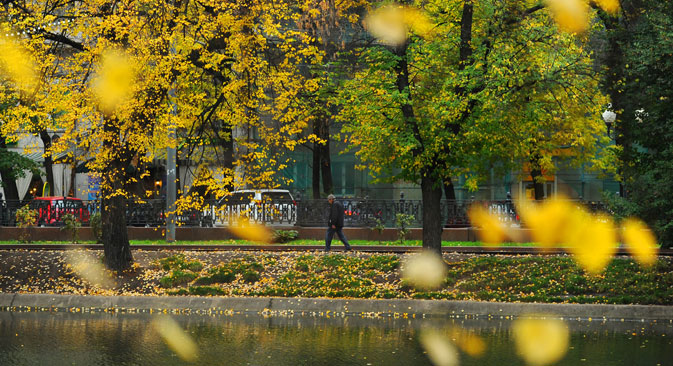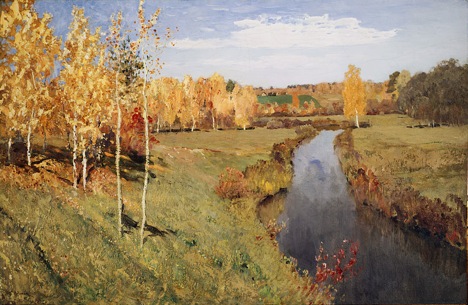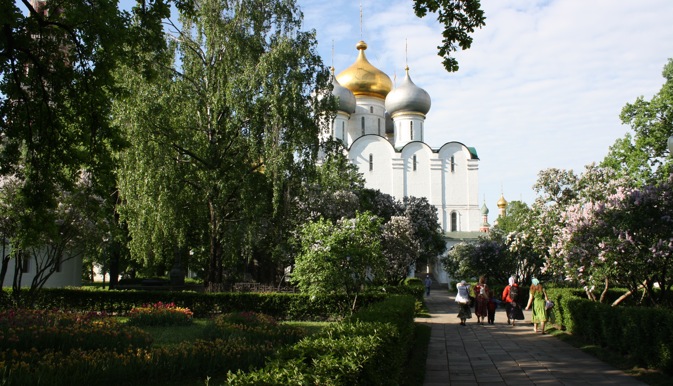Beauty and sadness: Russian writers on autumn

Autumn brought out the creative best in Russia's great writers. Source: Itar-Tass
Yellow and gold are the predominant colours of foliage in the Russian autumn as depicted in artist Isaak Levitan’s oil on canvas masterpiece “Golden Autumn.” Artists felt particularly inspired by the colours of the season but autumn, with its harvests, unpredictable weather and traditions such as mushroom and blueberry picking tended to invoke mixed emotions among the country’s great writers.
For some great writers, autumn was a gloomy season, one that was often compared to the autumn of life. The season invoked nostalgia and childhood memories for Fyodor Dostoyevsky, but also a degree of glumness with the contemporary reality that life was indeed passing by. He expressed these feelings, like in most of his books, through its protagonists.
In Dostoyevksy’s first novel, Poor Folk, (which is in the form of letters between two people), Varvara Dobroselova writes: “How I used to love the country in autumn! Then but a child, I was yet a sensitive being who loved autumn evenings better than autumn mornings. I remember how beside our house, at the foot of a hill, there lay a large pond, and how the pond--I can see it even now!--shone with a broad, level surface that was as clear as crystal.” In her letter to Makar Devushkin, Dostoyevsky’s protagonist continues to vividly describe the season in the countryside and the “golden time” that was her childhood.

Isaak Levitan 'Golden Autumn' (1895). Source: wikipedia.org
Dobroselova goes on to write: “Carried away by these memories, I could weep like a child. Everything, everything comes back so clearly to my recollection! The past stands out so vividly before me! Yet in the present everything looks dim and dark! How will it all end?--how? Do you know, I have a feeling, a sort of sure premonition, that I am going to die this coming autumn; for I feel terribly…” In his later books, Dostoyevsky would continue to draw metaphors from the season. “The world of fancies will fade, dreams will wilt and die and fall like autumn leaves from the trees,” he wrote in White Nights.
“Just as a painter needs light in order to put the finishing touches to his picture, so I need an inner light, which I feel I never have enough of in the autumn.” Many have attributed that quote of Leo Tolstoy to a writer’s block that he felt in the season. Yet the great novelist was at his poetic best when describing the autumn in War and Peace. His description of the weather during the period between the Battle of Borodino to the entry of the French into Moscow leaves readers completely spellbound: “…during the whole of that agitating, memorable week, there had been the extraordinary autumn weather that always comes as a surprise, when the sun hangs low and gives more heat than in spring, when everything shines so brightly in the rare clear atmosphere that the eyes smart, when the lungs are strengthened and refreshed by inhaling the aromatic autumn air, when even the nights are warm, and when in those dark warm nights, golden stars startle and delight us continually by falling from the sky.”
In Reminisces of Anton Chekhov, Maxim Gorky compared the stories of Chekhov with the late-autumn. “Reading Anton Chekhov's stories, one feels oneself in a melancholy day of late autumn, when the air is transparent and the outline of naked trees, narrow houses, greyish people, is sharp,” Gorky wrote. No doubt, that Gorky, who was highly critical of Chekhov, was no fan of the autumn. “Everything is strange, lonely, motionless, helpless. The horizon, blue and empty, melts into the pale sky, and its breath is terribly cold upon the earth, which is covered with frozen mud. The author's mind, like autumn sun, shows up in hard outline the monotonous roads, the crooked streets, the little squalid houses in which tiny, miserable people are stifled by boredom and laziness and fill the houses with an unintelligible, drowsy bustle.”
If there was one legend of Russian literature who loved the autumn with a great amount of passion, it was Alexander Pushkin, whose words ring closest to the heart of this writer:
“People have harsh words for these days of autumn,
but, reader, they are dear to me, I love
their unassuming light, their quiet beauty.
Autumn attracts me like a neglected girl
among her sisters. And, to be quite honest,
she is the only one that warms my heart.
She has her good points; whimsically dreaming
and free from vanity, I find her charms appealing.”
Autumn struck a particular chord with the greats of Russian literature and reading little gems about the season that are tucked away in sometimes hidden corners of large novels, is just one more way of trying to discover the depths of the Russian soul. No matter what kind of emotions the season actually evoked in the minds of the legends, the colours, smells, sights and sounds of autumn actually brought out the descriptive and creative best in them.
All rights reserved by Rossiyskaya Gazeta.
Subscribe
to our newsletter!
Get the week's best stories straight to your inbox
